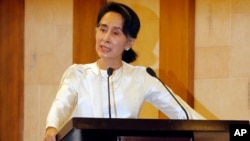At least 30 people died during fighting in Laukkai Monday between Myanmar army forces and armed fighters from ethnic groups.
Tension between the central government and ethnic militias in the northern region near China's Yunnan province erupted early Monday morning. Witnesses told VOA of hearing artillery and small arms fire in Laukkai, capital of the Kokang special region and an important trading town on the Salween River, which forms Myanmar's border with China.
Officials said the attack targeted three Laukkai locations including police and military posts. At least five traffic control police and five civilians were killed. Authorities also reported finding 20 burning bodies which could not be identified. Myanmar says there were no casualties among the security forces.
Worst violence since 2015
The latest attack comes amid efforts by Myanmar's de facto leader, Noble Peace Prize winner Aung San Suu Kyi, to bring all ethnic armed groups into the government-sponsored peace process through the signing of a nationwide cease-fire agreement. Monday's violence is among the worst to hit the Kokang region, in the northern part of Shan state, since 2015.
Aung San Suu Kyi's office blamed the Myanmar National Democratic Alliance Army (MNDAA) for the attack, saying in a statement, “According to initial information, many innocent civilians including a primary school teacher … were killed because of attacks by the MNDAA armed group.”
The statement added that four police officers were taken hostage and said there was a suspicion that groups other than the MNDAA were involved.
Ta Bone Kyaw, secretary general of the Palaung State Liberation Front (PSLF) and a senior commander of its armed unit, the Ta'ang National Liberation Army (TNLA) told VOA the attack was carried out primarily by the MNDAA after a decision by the Northern Alliance. The group includes the MNDAA, TNLA, the Kachin Independence Army (KIA), and the Arakan Army (AA). Aside from the KIA, “we were all in there,” he said.
“The fighting is along the border," he said, adding the fighting began around 1 a.m. Monday. "There was heavy fighting in two or three places."
Retaliation behind attack
An officer from the MNDAA's Division 211 told VOA the Laukkai attack was in retaliation for a recent government attack on the Moi Taik region.
Social media videos appeared to show areas of Laukkai on fire on Monday afternoon. An army source told the AFP news agency that the fighting was ongoing as darkness fell.
A Laukkai woman told VOA that artillery shelling and gunshots began around 1 a.m. The shooting continued until about 8 a.m., and the shelling until 11 a.m. or noon.
“I didn't dare move around,” she said. “I could not escape to China, because the border is closed,” she said, adding that fleeing to another location in Myanmar was just as impossible.
The Northern Alliance and government forces have clashed repeatedly in other northern areas of Shan State. Government authorities have blocked roads leaving Laukkai.
The Northern Alliance is led by the KIA, which includes the MNDAA. Members of the alliance have yet to join Myanmar's National Ceasefire Agreement (NCA). Complicating matters, Myanmar's military officials refuse to speak with representatives of the MNDAA for reasons that are unclear.
Some groups missing from talks
Talks called by Aung San Suu Kyi at the end of August were attended by representatives of 17 of the 20 major ethnic groups, including the Karen, Kachin, Shan and Wa, who together make up 40 percent of the country's population. But groups involved in Monday's fighting — the Ta'ang, also known as the Palaung, the Kokang minority's MNDAA, and the AA — did not take part in those talks.
The ethnic Kokang group controlled Laukkai and the surrounding area until 2009, when the government ousted the group's leader, Phon Kyar Shin, who is also known by his Chinese name, Peng Jiasheng. In February 2015, he orchestrated attacks on Laukkai, which triggered several months of deadly clashes between government and rebel forces in the border area.
This report originated on VOA Burmese.




